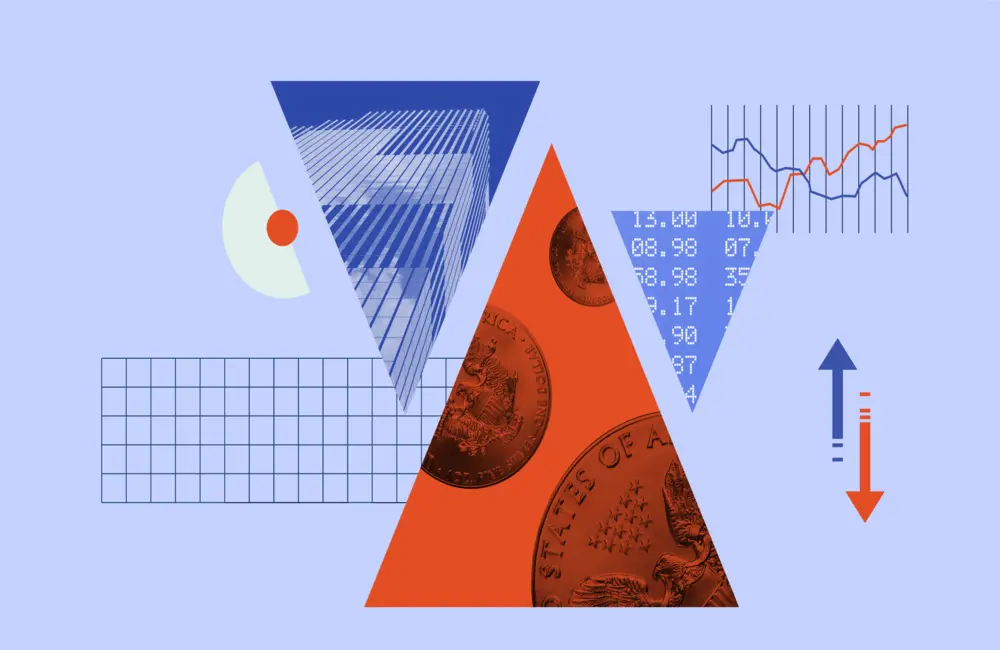ASX futures were down 26 points or 0.4 per cent at 6894 around 9.15 am AEST pointing to a weaker start to trading.
US stocks sank after the Federal Reserve revealed plans to begin raising interest rates in March, unwinding its pandemic-stimulus efforts and battling the fiercest inflation in decades. The Fed’s statement Wednesday afternoon (Thursday morning AEST) and news conference set off a wild end to a trading day that had reversed large early gains. The S&P 500 ended down 0.1 percent, and the wide index has now fallen in six out of the past seven trading days.
Stocks rose to begin the day, but cut gains after the Fed chair, Jerome Powell, told lawmakers that the central bank’s rate-setting committee is prepared to raise rates at its mid-March meeting. The Fed also confirmed that it had approved a final round of asset purchases, which will wind down the stimulus plan it implemented by March, and discussed plans to shrink its $9 trillion portfolio of securities, which has more than doubled since March 2020.
On Tuesday, the S&P/ASX 200 was down 2.5% at 6961.6, its lowest in some eight months, as energy and technology stocks fell 4.1% and 3.2%, respectively. All sectors closed in the red.
The heavyweight financials declined 2.7%, while materials fell 3.0%. Beach Energy finished 7.8% lower after reporting a 7% decline in 2Q oil and natural gas production, while Fortescue declined 5.0% after it reported its quarterly costs climbed 20% on year. Rio Tinto shed 0.8% after its Oyu Tolgoi partners secured deals to push ahead with a copper project.
Zip slid 2.1% after telling investors that it’s in early-stage talks to buy the North America-focused buy-now-pay-later provider, Sezzle. Australia’s big banks finished between 2.0% and 3.6% lower.
And on Tuesday new data revealed inflation soared beyond Reserve Bank forecasts over the December quarter, putting pressure on the central bank to think seriously about a rate hike this year. The RBA’s preferred measure soared 2.6% to be above the bank’s own forecast of 2.25% and solidly within its target band of 2%-3%.
Overseas, the pan-continental Stoxx Europe 600 climbed 1.7 percent, led by gains in the travel and leisure sector. Indexes in Asia ended mixed. The Shanghai Composite in China rose 0.7% and Hong Kong’s Hang Seng up 0.2%. Japan’s Nikkei 225 and South Korea’s Kospi slid 0.4%.
For commodities, gold futures dropped 1.2% to $US1832.00 an ounce; Brent crude increased 1.7% to $US89.74; while iron ore gained 0.2% to US$138.10 a tonne.
US Federal Reserve hinting at– a March hike. In other news, Bonds markets sold off. The yields on the Australian 10-year bond vaulted to 2.05% and the benchmark US 10-year Treasury yield jumped up to 1.86%. Yields fall when prices rise.
The Australian dollar was 71.10 US cents near 9.00am AEST, down from previous close 71.52. The WSJ Dollar Index, which measures the US dollar against 16 others, gained to 90.13.
Asia
Chinese shares ended with gains while rebounding from Tuesday's plunge, aided by renewables and auto makers. The recent weakness in the market was a reflection of risk-off sentiment, possibly before the Lunar New Year (LNY) holiday, but A-shares may bounce back after the LNY holiday if Beijing continues to ramp up policy moves, according to Huatai Securities. Solar-panel manufacturer LONGi Green Energy climbed 3.8% and in a trading debut, Jinko Solar more than doubled in Shanghai; electric-vehicle battery maker CATL gained 3.9% and BYD Co. 3.8%. Healthcare shares declined. WuXi AppTec dropped 5.0% and Hangzhou Tigermed fell 6.1%. The Shanghai Composite Index rose 0.7%, the Shenzhen Composite Index gained 0.7% and the ChiNext Price Index was up 1.0%.
Hong Kong’s Hang Seng Index ended up 0.2%, following a strong performance in the U.S. ADR market overnight. Sentiment was also bolstered by a reiteration by Chinese Premier Li Keqiang that the country will introduce further measures to stabilize growth in the economy. Consumer stocks rose, thanks in part to the Lunar New Year holiday. Budweiser Brewing rose 1.6% while ANTA Sports Products was up 0.1%. China Railway Group picked up 1.9% after its consortium won a CNY17.55 billion contract with the Philippines Transportation Department. Markets are still waiting on the outcome of the US Federal Reserve meeting.
Japan’s Nikkei Stock Average was 0.4% lower, with losses driven by a mixed bag of companies. Fed’s potential 50 bps hike in March is still keeping the markets on cautious footing while sustained geopolitical tensions between the West and Russia over Ukraine continue to pile on because jitters, according to OCBC. Shionogi & Co. fell 5.8% and Unicharm Corp fell 3.7%, while Nidec Corp lost 3.2% and Fanuc Corp shed 3.3% ahead of their earnings due later in the day.
Europe
European shares gain in closing trade ahead of Federal Reserve interest-rate decision later. The pan-European Stoxx 600 closed 1.7 percent higher.
“The latest Fed decision is just hours away, but with stocks at more ‘attractive valuations’ after the recent pullback, the lure of buying the dip proves too strong for many to resist,” IG analyst Chris Beauchamp notes. The Bank of Canada’s decision to keep rates unchanged today, despite some expectation it would raise rates, offers insight into what we might see from the Fed’s meeting, he says.
The FTSE in London climbed 1.3%, lifted by traveling, retailing, and energy stocks, with IAG, Ocado and Shell the biggest gainers. The index briefly erased its losses for the week as higher energy prices and yields supported gains, and ahead of the outcome of the latest meeting of the U.S. Federal Reserve.
“We have also seen a long overdue bounce in travel shares after earlier uncertainty this week as an imminent dropping of testing for fully vaccinated passengers sees a sharp rally in the likes of IAG, easyJet and Holiday Inn owner IHG,” Michael Hewson at CMC Markets said.
North America
Stocks declined after the Federal Reserve signaled that it planned to begin raising interest rates in March, bringing an end to its pandemic stimulus campaign and combating high inflation.
In a wild finale to a trading day that had reversed hefty early gains, the Fed’s statement Wednesday afternoon and news conference afterwards unleashed the volatility. The S&P 500 ended down 6.52 points, or 0.1 percent, at 4,349.93, with the broad index now deep in decline on six of the last seven days of trading. The tech-heavy Nasdaq Composite Index rose 2.82 points, or less than 0.1%, to 13542.12, and the Dow Jones Industrial Average declined 129.64 points, or 0.4%, to 34168.09.
Stocks climbed at the start of the day, but gave back gains after Fed Chairman Jerome Powell said the central bank’s rate-setting committee is prepared to increase rates at its mid-March meeting. The Fed also said it had sanctioned a final round of asset purchases which will bring its stimulus program to an end by March, and it also outlined plans to shrink its $9 trillion securities portfolio that has more than doubled in size since March 2020.
With Wednesday’s trade done, all three of the major indexes have more than 5% losses for 2022 so far, and the Nasdaq is down 13%.
“It’s certainly a crazy start to the year,” said Josh Chastant, a senior investment analyst at GuideStone Capital Management. “You would expect that when you go from a stimulative Fed to a less accommodative Fed.”
Worries over the pace of Fed interest rate rises, and their likely toll on some stocks popular with individual investors, were clear Wednesday. Shares of AMC Entertainment and GameStop both gained, by 13 percent and 17 percent, respectively, in the run-up to the announcement, in part reflecting expectations that the market had put at least the worst of its January jitters behind it. Shares of those companies slid after the Fed announced its decision: AMC finished the day down $0.08, or 0.5%, to $15.94, while GameStop was up $3.47, or 3.5%, at $103.26. The ARK Innovation exchange-traded fund fell $1.77, or 2.5 percent, to $69.03.
“We probably had a little more exuberance in the morning than we should have,” said Jeff Klearman, a portfolio manager at GraniteShares.
The tech sector of the S&P 500 climbed as much as 4% at the start of trading, closing 0.7% higher. Microsoft gained $8.22, or 2.9 percent, to $296.71 after the software giant said its earnings continued to grow, fueled in part by a strong showing from its cloud-services business. Semiconductors were also strong: Nvidia climbed $4.48, or 2 percent, to $227.72, Micron Technology rose $1.25, or 1.6 percent, to $81.97 and AMD increased $0.42, or 0.4 percent, to $110.71.
Investors should focus on stocks within more economically sensitive sectors rather than tech names, which are less appealing when rates rise, Mark Luschini, chief investment strategist at Janney Montgomery Scott, said early Wednesday.
“It’s too early to say, ‘OK, that flush was it, and now we just re-engage the bull market steaming ahead,’” Mr. Luschini said of the declines early in January.
In bond markets, the yield on the benchmark 10-year Treasury note closed Wednesday at 1.845%, and that of the 2-year Treasury note settled at 1.089%, the highest level since February 2020. Yields fall as prices rise and vice versa.
The Fed’s statement acknowledged the continuing spread of the Omicron variant of Covid-19, stating that “the path of the economy continues to depend on the course of the virus.” US data indicated new daily vaccine-induced deaths from the disease surpassing those of the Delta variant peak.
Investors are also watching tensions between Russia and Ukraine that have attracted the attention of NATO allies. Geopolitical turbulence has supported oil in the past few days, shooting it to the highest level since 2014.
The VIX, a gauge of expected volatility sometimes known as Wall Street’s fear gauge, has risen this week as stock markets dropped.
In other stocks, Mattel advanced by $ 0.85, or 4.3 percent, to $20.46 after The Wall Street Journal said it had won the license to produce toys based on the lineup of Walt Disney’s princess lineup, along with from the Home “Frozen” franchise. Texas Instruments rose $4.37, or 2.5 percent, to $178.33 after the company reported greater revenue. AT&T shares dropped $2.23, or 8.4 percent, to $24.25 after the company returned to profit as it focused on its wireless revenue and shed the weight of a pay-TV business that had started losing customers in 2021.
The dollar value of Bitcoin fell 0.4% from its 5 pm New York time Tuesday level to $36,740. The world’s largest cryptocurrency by market value has also sagged recently along with broader markets, losing nearly half its value from its peak in November.






















